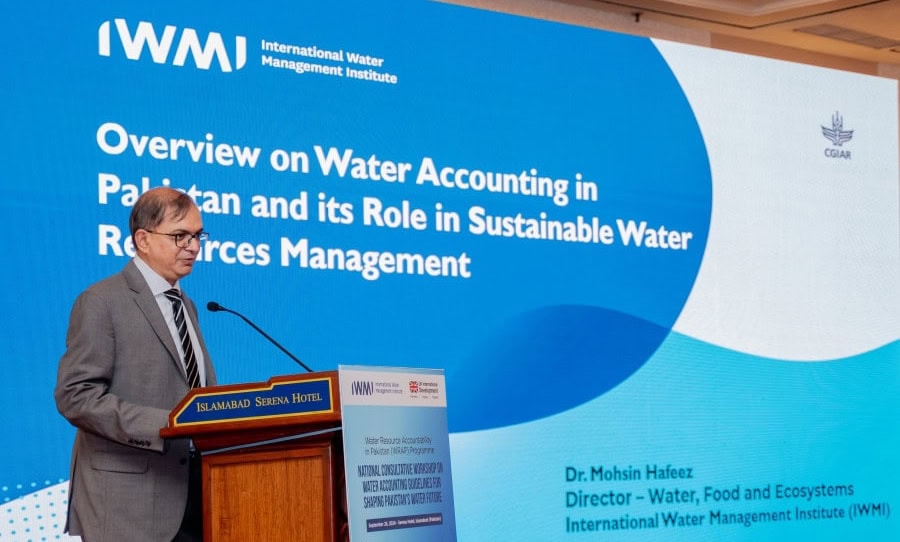ISLAMABAD—Experts gathered at a National Consultative Workshop on Friday to discuss the importance of evidence-based technological solutions and accurate real-time data. Hosted by the International Water Management Institute (IWMI), the event demanded smart innovations to effectively manage the nation’s water resources.
The workshop, hosted under the UK Aid-funded Water Resource Accountability in Pakistan (WRAP) Programme, aimed to support the implementation of the National Water Policy (NWP). It welcomed over 100 participants, including government officials, representatives from development agencies, private sector leaders, academia, and members of local communities from all provinces and regions.
Throughout the event, discussions and presentations revolved around Pakistan’s water scarcity challenges and the successful strategies implemented through the WRAP Programme in Punjab and KP. Dr. Mohsin Hafeez, Director for Water, Food and Ecosystems and Team Leader for the WRAP Programme, briefed the meeting on water accounting in Pakistan and its role. He said that our national institutions, such as the National Disaster Management Authority (NDMA) and Provincial Disaster Management Authority (PDMA), have a robust system in place to handle unfortunate incidents in the country. However, regrettably, they lack an early warning system to prevent floods and disasters.
He cited other examples, including the country’s inaccurate groundwater data, which hinder proper decision-making regarding water management. While giving an overview of the WRAP programme, Dr Hafeez said IWMI Pakistan had developed a water accounting framework in the Okara district and launched the Groundwater Management Information System (GMIS) to address water scarcity in Punjab province. The phased system was initially implemented as a pilot project in the Rahim Yar Khan and Okara districts, with plans to gradually expand to other cities. Earlier, Eddy Covariance flux towers were installed in Okara, Chakwal, Rahim Yar Khan, and Sheikhupura, which would provide data on water and carbon emissions in agriculture and contribute to agroecological zoning.
Dr. Hafeez said that IWMI Pakistan has organised four consultation workshops at the provincial level so far. The workshops brought together key stakeholders, including federal and provincial government officials, policymakers, water experts, and practitioners from across the country, to discuss and deliberate on the importance of water accounting and its implications for sustainable water management.
As the chief guest, Engr. Ahmad Kamal, Chairman of the Federal Flood Commission (MoWR), said the challenges and opportunities in the Indus Basin related to water accounting and management are significant. He mentioned that Pakistan is the eighth most vulnerable country to climate change and has been consistently ranked among the top 10 most climate-vulnerable countries over the last 30 years. He also pointed out the absence of a regulatory framework for groundwater, allowing unlimited abstraction of groundwater, which has led to the rapid depletion of groundwater sources across Pakistan.
Dr. Yasir Mohamed, a Professor of Water Resources Management at IHE Delft in the Netherlands, gave an overview of water accounting and its global implications. He said the importance of remote sensing, satellite data, and GIS in obtaining accurate results for water accounting cannot be overstated. He also said the need for good networking connections is essential to ensure the collection of precise data.
The workshop concluded with group work sessions focusing on water accounting recommendations and scaling up the issue at the national level. DG PMD Mahr Sahibzad Khan delivered the closing remarks at the workshop. Other speakers included Dr. Muhammad Ashraf, IWMI’s Advisor for Science and Policy, and Dr. Jehanzeb Masud Cheema, Deputy Country Representative of IWMI Pakistan.










